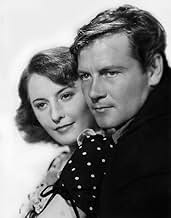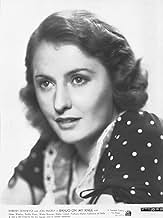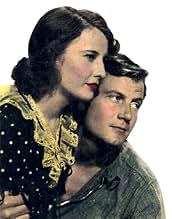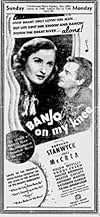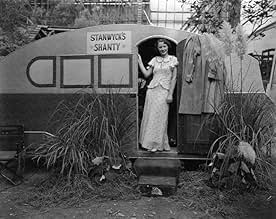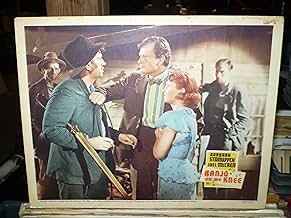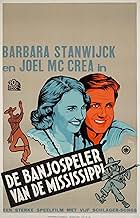VALUTAZIONE IMDb
6,1/10
722
LA TUA VALUTAZIONE
Aggiungi una trama nella tua linguaBelieving he has killed a guest, a groom flees on his wedding night.Believing he has killed a guest, a groom flees on his wedding night.Believing he has killed a guest, a groom flees on his wedding night.
- Regia
- Sceneggiatura
- Star
- Candidato a 1 Oscar
- 1 vittoria e 1 candidatura in totale
Tony Martin
- Chick Bean
- (as Anthony Martin)
Katherine DeMille
- Leota Long
- (as Katherine De Mille)
Hall Johnson Choir
- Vocal Ensemble
- (as The Hall-Johnson Choir)
Herbert Ashley
- Minor Role
- (non citato nei titoli originali)
Fred Behrle
- Minor Role
- (non citato nei titoli originali)
Recensioni in evidenza
... one of the most bizarre movie musicals ever made. As someone else mentioned, this film makes more sense if you think about when it was made - 1936 - and what it represents - the marriage of Darryl F. Zanuck's 20th Century Pictures that was aiming to make a name for itself in musicals and with well-known stars, and failing Fox Films, which had specialized in films for and about rural folk from its inception until its bankruptcy in 1935. This film was made the year after their merger and so the aims of both companies show through. What results is a rustic semi-musical about rural Southern folk starring two stars (Stanwyck and McCrea) who do their best but really don't belong here. Buddy Ebsen and Walter Brennan seem much more at home here with charming performances you'll expect given their roles in other films.
What's a shame is that Barbara Stanwyck really isn't given more to do here. What's also a shame is that Joel McCrea, an actor who is a favorite of mine, is relegated to the part of the mindless muscle. He thinks with his fists, takes actions that make no sense when those fists have consequences, is kind and even obliging to people that are obviously trying to use him, and thoughtless to those who love him.
I really liked the musical performances and I thought the tunes were quite catchy and memorable. It's just a shame more effort wasn't put into making a story that played to Stanwyck and McCrea's strengths.
What's a shame is that Barbara Stanwyck really isn't given more to do here. What's also a shame is that Joel McCrea, an actor who is a favorite of mine, is relegated to the part of the mindless muscle. He thinks with his fists, takes actions that make no sense when those fists have consequences, is kind and even obliging to people that are obviously trying to use him, and thoughtless to those who love him.
I really liked the musical performances and I thought the tunes were quite catchy and memorable. It's just a shame more effort wasn't put into making a story that played to Stanwyck and McCrea's strengths.
The total movie, if one goes by the plot and the practicality of it, is much below standard - too many coincidences - not only in hit but also misses and also the bigamy at the end, with active connivance - or support from all, including the Justice of Peace (of course the first, and hence legal, wife is excluded from this list) .
But sometimes that doesn't matter - when the speed of the narration is just right, and with the lovely musicals and witty dialogue, unless one is really a professional critic, trying to tear everything in view to shreds, the movie is a bit better than just OK. And of course I have to add the radiant Barbara in the list. And of course I shouldn't miss on the very lovable grandma (whose?) Helen Westely, she too sparkled every time she was put on screen.
Good enough for one view, and considering the music, dialogues etc, may be repeat ? I can't give it 8, it is somewhere about 7.25-7.5 on my scale.
Good enough for one view, and considering the music, dialogues etc, may be repeat ? I can't give it 8, it is somewhere about 7.25-7.5 on my scale.
Rather ill-conceived and condescending Fox musical study of "river folk," meaning mindless Southerners who overreact to perceived slights and say "dad-blamed" a lot. River lad Joel McCrea, always appealing but playing a really unlikable leading man, marries "land girl" Barbara Stanwyck, none too bright herself, then high-tails it to Europe on his wedding night when he mistakenly thinks he's killed Victor Kilian, who got fresh with his bride. Walter Brennan's his superannuated dad; if you like Brennan's style of corn pone and shtick you'll like him here, but I don't. Stanwyck, surprisingly believing the lies of citified Walter Catlett, follows him to New Orleans, then has second thoughts, and ends up washing dishes in Minna Gombell's cafe, where she also harmonizes with Tony Martin and soft-shoes a bit with Buddy Ebsen. I love Stanwyck, but singing and dancing really aren't her fortes, and one is constantly aware that she's more intelligent than the woman she's playing. More interesting is a scowling, Joan-Crawford-looking Katherine de Mille, as her nasty rival. There are some nice musical interludes, notably an elaborate "St. Louis Blues" with the Hall Johnson Choir, but the plot meanderings are arbitrary and the ending's never in doubt. Nicely photographed, with an impressive river storm near the end.
"Banjo on my Knee" is a 1936 film that will keep you guessing as to which direction it's headed nearly every time there's a scene change. McCrea plays a shantytown boy who marries a land girl (Stanwyck). The patriarch of McCrea's family, played by Walter Brennan, is desperate for a grandchild. Unfortunately, Stanwyck and McCrea can't seem to get their marriage consummated. On their wedding night, they think McCrea has murdered someone (he hasn't), so McCrea takes off for six months and sees the world while his wife waits none too patiently. The day he comes home, he talks about moving the family to Aruba and says he'll go down first for a month and then send for her. The couple get into a terrible fight because Stanwyck doesn't want to be left again. The two of them then split up again - that instant. She goes to New Orleans to work for a slimy photographer, but no sooner does she get to his apartment that she bolts and takes a job as a dishwasher in a bar.
Soon, the entire population of Shantytown is in New Orleans looking for her and for McCrea. At the bar, Tony Martin is a saloon singer who falls for Stanwyck, and soon, Buddy Ebsen, another Shantytown resident, and Walter Brennan are big hits performing there, and Stanwyck is doing duets with Martin. It goes on from there.
Some of the music is great, the highlight being "St. Louis Woman" with Brennan and the Hall Johnson Choir. Martin looks and sounds like an angel - his voice is just stunning in "There's Something in the Air" and "Where the Lazy River Goes By." Stanwyck sings just like she talks - her voice is low, pleasant, and natural. The cast is uniformly good, and Katharine DeMille has a showy role as Leota, who's in love with McCrea. McCrea, of course, is tall, handsome, and boyishly gorgeous.
I wasn't expecting a musical, and in the beginning, "Banjo on My Knee" seemed like a drama, so I never was sure what I was watching. Odd though the film may be, it was loads of fun.
Soon, the entire population of Shantytown is in New Orleans looking for her and for McCrea. At the bar, Tony Martin is a saloon singer who falls for Stanwyck, and soon, Buddy Ebsen, another Shantytown resident, and Walter Brennan are big hits performing there, and Stanwyck is doing duets with Martin. It goes on from there.
Some of the music is great, the highlight being "St. Louis Woman" with Brennan and the Hall Johnson Choir. Martin looks and sounds like an angel - his voice is just stunning in "There's Something in the Air" and "Where the Lazy River Goes By." Stanwyck sings just like she talks - her voice is low, pleasant, and natural. The cast is uniformly good, and Katharine DeMille has a showy role as Leota, who's in love with McCrea. McCrea, of course, is tall, handsome, and boyishly gorgeous.
I wasn't expecting a musical, and in the beginning, "Banjo on My Knee" seemed like a drama, so I never was sure what I was watching. Odd though the film may be, it was loads of fun.
Banjo On My Knee could be considered a transitional film for the newly created 20th Century Fox. Before 20th Century Pictures merged with Fox Film Corporation in 1936, Fox films stock in trade were these rustic type movies that starred either Will Rogers or Janet Gaynor or both even.
When Darryl Zanuck took over the new studio he changed the look entirely and 20th Century Fox became known for some splashy musicals. Banjo On My Knee is a hybrid of both the old and new studio.
Barbara Stanwyck and Walter Brennan take on parts that would have been reserved for Janet Gaynor and Will Rogers previously. Stanwyck is a land girl and she marries Brennan's son Joel McCrea. Brennan and the whole clan live on a houseboat that is moored to a sandbar island in the middle of the Mississippi. These folks don't work, they just drop a line into the Mississippi for food a few times a day.
But the wedding night is eventful because before Joel and Barbara can get to the consummation business, Victor Klllian gets fresh with Stanwyck and McCrea knocks him into the river. Thinking he's killed Killian, McCrea skedaddles to New Orleans and joins the crew of an outbound freighter.
That sets in motion a series of events that keep Joel and Barbara from doing the deed. Not like there isn't other people interested in them. Barbara attracts the attention of Tony Martin in one of his early films and Joel already had a slinky and jealous Katharine DeMille, another river girl who'd like very much to move in where Stanwyck left off.
As for Brennan he wants these two to start kanoodling because he wants real bad to be a grandfather. They all wind up in New Orleans and then back up the Mississippi on their sandbar houseboat home.
I'm betting that Henry Fonda wasn't available so Joel McCrea was signed for this film. This is just the kind of part Fonda was specializing in doing in his early career. Others in the cast include Helen Westley as a pipe smoking grandma and Walter Catlett as a smarmy photographer who gets his clock cleaned several times for trying to move in on Stanwyck.
There were original songs written for this film by Jimmy McHugh and Harold Adamson, Tony Martin gets to sing a duet with Barbara Stanwyck who admittedly did not have much of a singing voice. Martin carries the brunt of that duet. Buddy Ebsen's presence is almost mandatory in a film about rural rustics and he contributes some dance numbers. Another player who specialized in rustic types is Spencer Charters and he was in Banjo On My Knee as well. I really did love the 'annulment' that he was ready to grant McCrea in order to marry Katharine DeMille.
I'm willing to make a small wager that Banjo On My Knee was a project that Fox films might have intended for Will Rogers with his role built up more than it is here. Right around the time that the studios were merging Rogers was killed in that plane crash in Alaska. Banjo On My Knee is not a bad film, but I'm betting that Will Rogers would have made it something special.
When Darryl Zanuck took over the new studio he changed the look entirely and 20th Century Fox became known for some splashy musicals. Banjo On My Knee is a hybrid of both the old and new studio.
Barbara Stanwyck and Walter Brennan take on parts that would have been reserved for Janet Gaynor and Will Rogers previously. Stanwyck is a land girl and she marries Brennan's son Joel McCrea. Brennan and the whole clan live on a houseboat that is moored to a sandbar island in the middle of the Mississippi. These folks don't work, they just drop a line into the Mississippi for food a few times a day.
But the wedding night is eventful because before Joel and Barbara can get to the consummation business, Victor Klllian gets fresh with Stanwyck and McCrea knocks him into the river. Thinking he's killed Killian, McCrea skedaddles to New Orleans and joins the crew of an outbound freighter.
That sets in motion a series of events that keep Joel and Barbara from doing the deed. Not like there isn't other people interested in them. Barbara attracts the attention of Tony Martin in one of his early films and Joel already had a slinky and jealous Katharine DeMille, another river girl who'd like very much to move in where Stanwyck left off.
As for Brennan he wants these two to start kanoodling because he wants real bad to be a grandfather. They all wind up in New Orleans and then back up the Mississippi on their sandbar houseboat home.
I'm betting that Henry Fonda wasn't available so Joel McCrea was signed for this film. This is just the kind of part Fonda was specializing in doing in his early career. Others in the cast include Helen Westley as a pipe smoking grandma and Walter Catlett as a smarmy photographer who gets his clock cleaned several times for trying to move in on Stanwyck.
There were original songs written for this film by Jimmy McHugh and Harold Adamson, Tony Martin gets to sing a duet with Barbara Stanwyck who admittedly did not have much of a singing voice. Martin carries the brunt of that duet. Buddy Ebsen's presence is almost mandatory in a film about rural rustics and he contributes some dance numbers. Another player who specialized in rustic types is Spencer Charters and he was in Banjo On My Knee as well. I really did love the 'annulment' that he was ready to grant McCrea in order to marry Katharine DeMille.
I'm willing to make a small wager that Banjo On My Knee was a project that Fox films might have intended for Will Rogers with his role built up more than it is here. Right around the time that the studios were merging Rogers was killed in that plane crash in Alaska. Banjo On My Knee is not a bad film, but I'm betting that Will Rogers would have made it something special.
Lo sapevi?
- QuizTwo of the three original songs from the movie became top ten hits on the music charts. "Where the Lazy River Goes By" went to #7 in a recording by Teddy Wilson and His Orchestra, with a vocal by Midge Williams on the Brunswick label, and "There's Something in the Air" by Shep Fields and his Rippling Rhythm Orchestra, with a vocal by Bob Goday on the Bluebird label, went to #5.
- Citazioni
Pearl Elliott Holley: Shuck or be shucked
- ConnessioniFeatured in Barbara Stanwyck: Fire and Desire (1991)
- Colonne sonoreWhere the Lazy River Goes By
(1936)
Music by Jimmy McHugh
Lyrics by Harold Adamson
Played on harmonica by Joel McCrea and sung by Barbara Stanwyck
Performed also by Barbara Stanwyck and Tony Martin
I più visti
Accedi per valutare e creare un elenco di titoli salvati per ottenere consigli personalizzati
- How long is Banjo on My Knee?Powered by Alexa
Dettagli
- Tempo di esecuzione
- 1h 35min(95 min)
- Colore
- Proporzioni
- 1.37 : 1
Contribuisci a questa pagina
Suggerisci una modifica o aggiungi i contenuti mancanti

